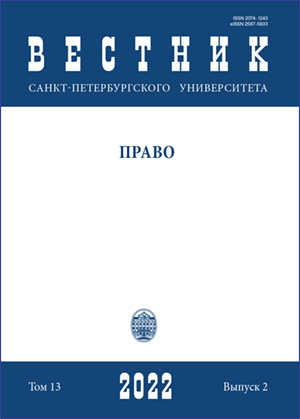The role of language in providing intelligibility and certainty of normative legal acts
DOI:
https://doi.org/10.21638/spbu14.2022.201Abstract
Clearness (intelligibility) and certainty of content are required from normative legal acts in the contemporary legal doctrine and in judicial practice (especially in the practice of constitutional courts). These requirements primarily concern language of texts of normative legal acts, as most lawyers find guarantees of accessibility for understanding by most of addressees in the textual fixation of legal norms. The question of how texts of normative legal acts can provide this — the question lying on the border between law and linguistic — is not answered today. Lawyers focus on ways and means of interpretation of texts, and these ways and means are treated as universal principles and dogma, but this is a solution for extraction of legal norm that often does not guarantee certainty and usually does not provide intelligibility. This article demonstrates rules of making normative acts which can provide intelligibility and certainty as interconnected but autonomous and independent requirements to legal texts basing on joint legal-linguistic researches of intelligibility and certainty of legal texts. There is a tension between requirements of intelligibility and certainty, though it should not be exaggerated, as the effective measures providing these two do not conflict and could be realized together. Fulfilling these requirements working out all normative acts should be accompanied with description of their meta-normative parameters, inter alia — description of addressees of normative prescriptions of norms of these acts as well as signs of occurrences, conditions and circumstances significant for the content of legal norms and its applying.
Keywords:
legal certainty, intelligibility of official documents, normative acts, making legal documents, legal communication, language of legal documents, intelligibility of legal language, difficulties of understanding of documents
Downloads
References
Downloads
Published
How to Cite
Issue
Section
License
Articles of "Vestnik of Saint Petersburg University. Law" are open access distributed under the terms of the License Agreement with Saint Petersburg State University, which permits to the authors unrestricted distribution and self-archiving free of charge.






